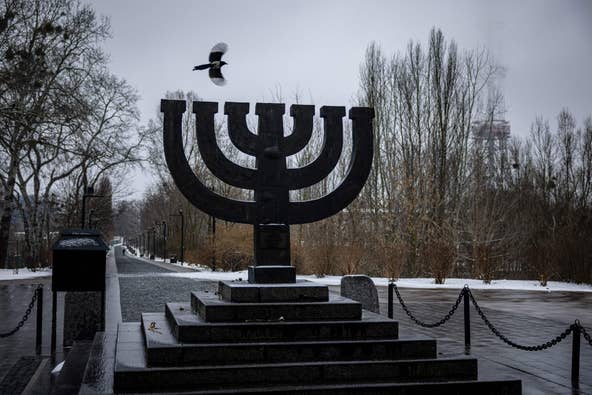Nadene Goldfoot
Jews of Lithuania had immigrated South to Kharkiv, Ukraine. By the early 20th century, Kharkiv was home to around 11,000 Jews.
As Kharkiv was located outside of the Pale of Settlement, Jewish residence was strictly controlled by the Russian government. Jews lost the right to enter the city in 1821, but regained that right in 1835 when the Governor of the Kharkov Governorate complained about the loss of more than 10 million rubles in revenue. Between 1855 and 1881, during the rule of Alexander II, a policy of selective emigration encouraged the migration of "useful" Jews to the city. By the late 19th century, the city had become a prominent center for the Zionist movement in Russia. The Jewish population significantly increased during the Soviet era, when Kharkiv's Jewish community doubled from 65,000 to 130,000 between 1923 and 1939.
Aftermath of the Babi-Yar massacre. At least 34,000 Jews died here in late September 1941.

In late September 1941, SS and German police units and their auxiliaries perpetrated one of the largest massacres of World War II. It took place at a ravine called Babyn Yar (Babi Yar) just outside the Ukrainian capital city of Kyiv.
During the Holocaust, when Ukraine was occupied by the Nazi Reichskommissariat, thousands of Jews were murdered in Kharkiv. 15,000 Jews were murdered by the Nazis at Drobytsky Yar. Following World War II, the community saw a renewal, and by 1959 there were 84,000 Jews living in the city. However, Soviet repression of Jewish religion and culture had led to the liquidation of the Jewish theater in 1949, the closure of the last remaining synagogue in 1948–1949, and the arrest of Kharkiv's Rabbi Shmuel Lev in 1950.
During the 1960s and 1970s, Jews were persecuted for trying to celebrate the High Holidays. Later during perestroika, the city began to see a revival of Judaism and Jewish culture. The Kharkiv Choral Synagogue, which had been confiscated by the Soviet government at the urging of Jewish Communists, was reopened as a synagogue in 1990.
During the 1990s post-Soviet aliyah, many Jews from Kharkiv emigrated to Israel or to Western countries. By 2000, Kharkiv was home to 50,000 Jews.
During the 2022 Russian invasion of Ukraine, Kharkiv was the site of heavy fighting between the Ukrainian and Russian forces. On 27 February, the governor of Kharkiv Oblast Oleh Synyehubov claimed that Russian troops were repelled from Kharkiv.
According to a 28 February 2022, report from Agroportal 24h, the Kharkiv Tractor Plant (KhTZ), in the south east of the city, was destroyed and “engulfed in fire” by “massive shelling” from Russian forces. Video purported to record explosions and fire at the plant on 25 and 27 February 2022. UNESCO has confirmed that in the first three weeks of bombardment the city experienced the loss or damage of at least 27 major historical buildings.
On 4 March 2022, Human Rights Watch reported that on the fourth day of the invasion of Ukraine by the Russian Federation, 28 February 2022, Federation forces used cluster munitions in the KhTZ , the Moskovskyi and Shevchenkivskyi districts of the city. The rights group—which noted the "inherently indiscriminate nature of cluster munitions and their foreseeable effects on civilians"—based its assessment on interviews and an analysis of 40 videos and photographs. In March 2022, during the Battle of Kharkiv, the city was designated as a Hero City of Ukraine,
In May 2022, Ukrainian forces began a counter-offensive to drive Russian forces away from the city and towards the international border. By 12 May, the United Kingdom Ministry of Defence reported that Russia had withdrawn units from the Kharkiv area. Russian artillery and rockets remain within range of the city, and it continues to suffer shelling and missile strikes.
That was last year. This year on January 30, this was reported. An air raid on Ukraine’s northeastern city of Kharkiv has killed at least one person, as three people were killed in the southern city of Kherson amid renewed Russian shelling. “Today, the Russian army has been shelling Kherson atrociously all day,” Zelensky said in his Sunday evening video address.
Dedication to: Descendants of Mikhail Moisey Elia Leybovich Segal whose family died in Kharkiv, Ukraine.
Resource:
https://www.aljazeera.com/news/2023/1/30/missile-hits-kharkiv-apartment-block-killing-at-least-one
https://yivoencyclopedia.org/article.aspx/kharkiv
https://www.jewishvirtuallibrary.org/babi-yar




No comments:
Post a Comment